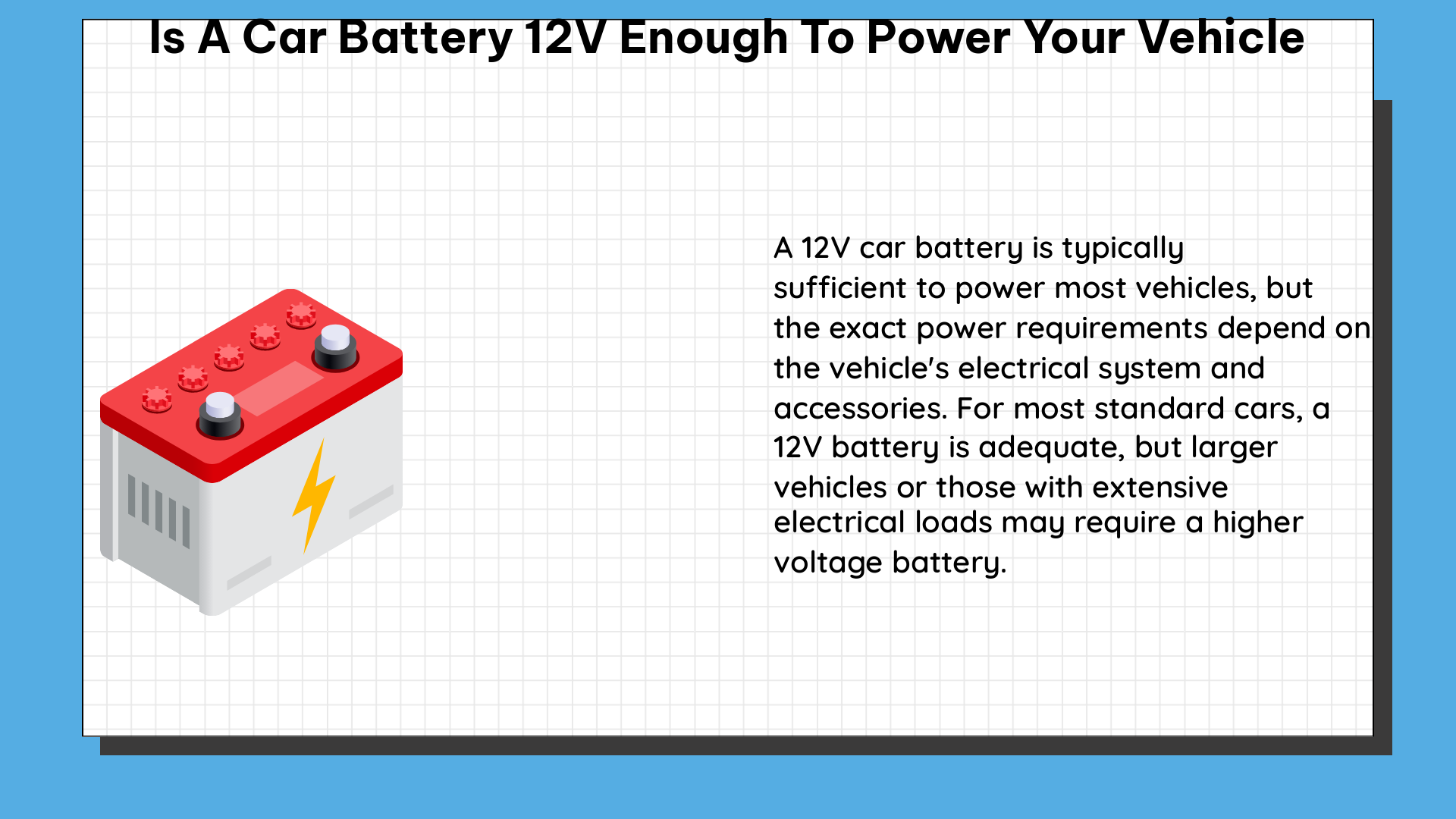A 12V car battery is designed to provide enough power to start and run a vehicle, but the actual voltage required to start a car can be lower than 12V. According to the search results, the minimum voltage required to start a car is 11.8V, but if you’re lucky, you may be able to start at 10.8V. However, a voltage lower than 10.8V generally makes it impossible to start the car, and you would need to replace the battery or use a car jump starter pack in an emergency.
Understanding Car Battery Voltage Requirements
The voltage required to start a car engine can vary depending on several factors, including the vehicle’s make, model, and age, as well as the condition of the battery and electrical system. Here’s a breakdown of the typical voltage requirements:
- Minimum Voltage to Start a Car: 11.8V
- Minimum Voltage to Start a Car (if lucky): 10.8V
- Voltage Below 10.8V: Generally makes it impossible to start the car, requiring a battery replacement or jump start
It’s important to note that these voltage thresholds are just general guidelines, and the actual voltage required may differ for your specific vehicle. Always refer to your owner’s manual or consult a professional mechanic for the recommended voltage range for your car.
Measuring Car Battery Voltage

When measuring the voltage of a 12V car battery, it’s essential to understand the different voltage readings you may encounter:
- Fully Charged Battery: A fully charged 12V car battery should read 12.6V on a multimeter when the vehicle is at rest.
- Charging System Voltage: Once the car is running, the voltage from the battery will be higher, typically ranging from 13.7V to 14.7V, depending on the battery and charging system.
- Cranking Voltage: A healthy car battery should maintain a voltage between 9V and 10V when cranking the engine.
If the battery voltage reading is lower than the recommended ranges, it may indicate a problem with the battery or the vehicle’s electrical system. In such cases, you should consider charging the battery or having it tested by a professional.
Factors Affecting Car Battery Voltage
Several factors can influence the voltage of a car battery, including:
- Battery Age and Condition: As a car battery ages, its ability to hold a charge and deliver the necessary voltage can diminish, leading to starting issues or even a complete battery failure.
- Electrical Load: The electrical load on the battery, such as running multiple accessories or leaving lights on, can drain the battery and reduce its voltage.
- Temperature: Extreme temperatures, both hot and cold, can affect the battery’s performance and voltage output.
- Alternator Performance: A malfunctioning alternator can prevent the battery from being properly charged, leading to a low voltage.
- Corrosion and Connections: Corrosion on the battery terminals or loose connections in the electrical system can also contribute to voltage drops.
Maintaining Optimal Car Battery Voltage
To ensure your car battery provides enough power to start and run your vehicle, it’s essential to maintain it properly. Here are some tips:
- Check Battery Voltage Regularly: Use a multimeter to check the battery voltage, both at rest and while the engine is running. This will help you identify any issues early on.
- Keep the Battery Clean: Regularly clean the battery terminals and connections to prevent corrosion, which can affect voltage.
- Charge the Battery as Needed: If the battery voltage is low, charge it using a battery charger or by taking your car for a drive.
- Replace the Battery as Needed: If the battery is old, damaged, or unable to hold a charge, it’s time to replace it with a new one.
- Avoid Excessive Electrical Load: Limit the use of accessories and turn off lights when the engine is not running to prevent draining the battery.
By understanding the voltage requirements and maintaining your car battery properly, you can ensure that your 12V car battery is enough to power your vehicle and keep it running smoothly.
References:
- How Many Volts Needed to Start a Car?
- What is a 12V Battery Voltage When Fully Charged?
- Car Battery Voltage Range

The lambdageeks.com Core SME Team is a group of experienced subject matter experts from diverse scientific and technical fields including Physics, Chemistry, Technology,Electronics & Electrical Engineering, Automotive, Mechanical Engineering. Our team collaborates to create high-quality, well-researched articles on a wide range of science and technology topics for the lambdageeks.com website.
All Our Senior SME are having more than 7 Years of experience in the respective fields . They are either Working Industry Professionals or assocaited With different Universities. Refer Our Authors Page to get to know About our Core SMEs.